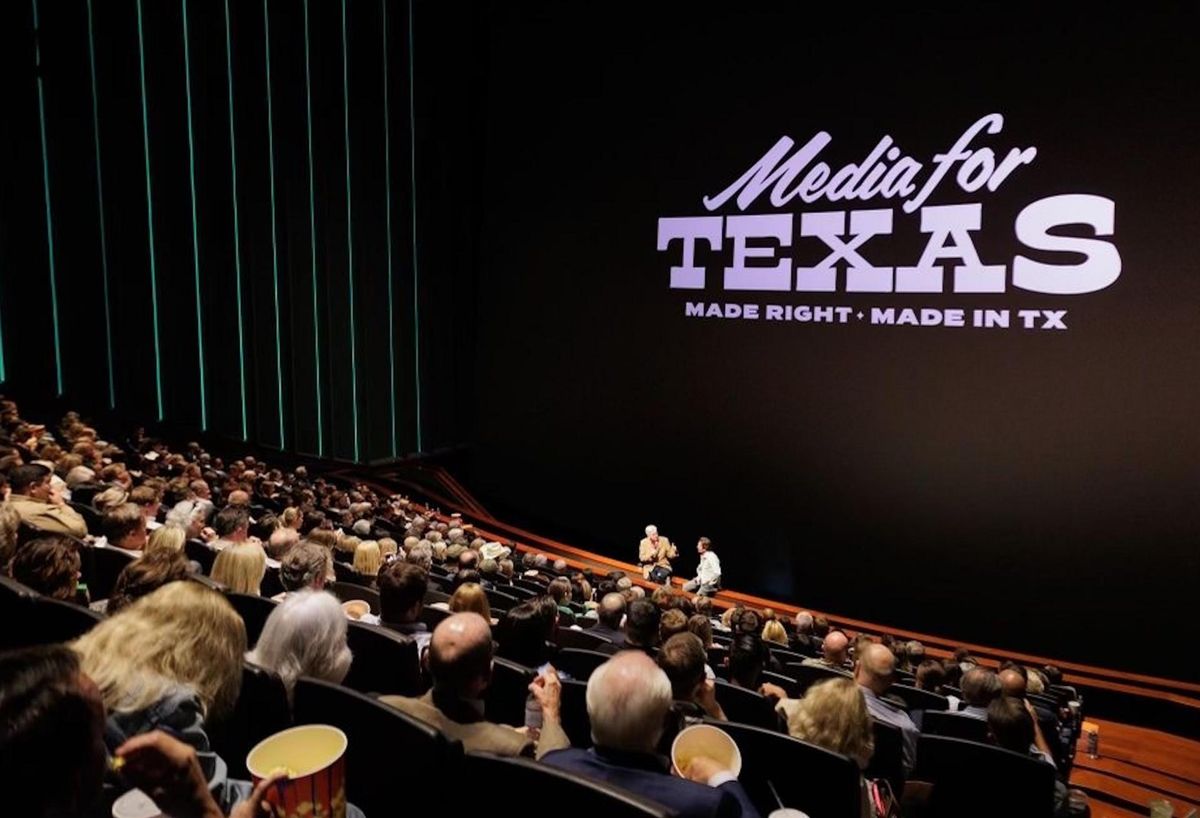Hot on the heels of challenging Wall Street with Y’all Street, Tinseltown Texas could be the Lone Star State’s next bid at giving an industry town a run for its money.
State legislators seriously upped funding for the Texas Moving Image Industry Incentive Program with the passage of Senate Bill 22 this year. The law guarantees $300M worth of program funding every two years for the next decade — a huge upgrade from the irregular funding amounts with no renewal guarantees of sessions past, according to industry advocates.
Hopes are high that the funding will spark a flurry of activity, including new studios and production facilities.
But some question whether it will be enough to truly spur a film-fueled cavalcade of real estate rollouts.

Courtesy of Media for Texas
“It would make sense that no one would break ground before we had this long-term incentive,” said Chase Musslewhite, a founder of advocacy group Media for Texas. “Because for real estate to have a boom in the way it needs to have a boom, you have to have that financial security to mitigate risk for the next decade.”
The funding is likely to draw more film and television production to Texas, spurring development to the likes of the upcoming Hill Country Studios, Musslewhite said. Hill Country’s plans to begin vertical construction on its $267M, 820K SF San Marcos project this year were partially dependent on the bill’s passing.
Other studios, including Bastrop 552 outside of Austin and Super Studios in Mansfield, are also preparing to break ground as SB 22 moves the needle, according to Media for Texas.
In addition to new studio projects, producers are expected to target existing industrial space, like Hillwood’s speculative industrial buildings at AllianceTexas in Fort Worth, North Texas Film Alliance founder and CEO Brian Whitlock said.
Yellowstone Director Taylor Sheridan’s Bosque Ranch Productions last week leased 450K SF in the development from Ross Perot Jr.’s Hillwood.
“We’re looking at an opportunity where there is a new asset class around this,” Whitlock said.
But that asset class might not grow quickly or turn immediate profits, and the new funding incentive won’t be a magic wand to turn Texas into the new Hollywood, according to some industry watchers and longtime studio owners.

Courtesy of ATX Film Studios
Advocates of the bill, including Lt. Gov. Dan Patrick, have touted Texas Film Commission numbers suggesting grant recipients would spend close to $5 for every $1 they receive. University of Southern California professor Michael Thom called that estimate “preposterous.”
Thom’s own research concluded incentives fail to stimulate enough economic activity to justify their cost and mostly produce temporary, low-paid jobs.
And he isn’t alone, with other critics arguing that return-on-investment estimates are far overblown, while the sector’s unpredictable, short-term leases make production studios among the riskier sectors to dabble in.
“If someone builds a studio, they’ll go bankrupt,” said Stephen Bieneman, principal of Austin’s ATX Film Studios, where actors Matthew McConaughey and Woody Harrelson are filming their (possibly) upcoming show, Brothers.
“The [rental] rates aren’t high enough, and they’re too infrequent.”
Bieneman didn’t build his 240K SF studio in South Austin, instead acquiring the building about three decades ago when it was a distribution warehouse for a food company with 14 years left on its lease. The company vacated earlier than expected, leaving him with a big, empty building in 2010.
That’s around the time ABC Disney came calling, asking about using the space for a year to film a mockumentary drama. Despite doing nothing to turn the building into a studio, more productions approached him. The money earned eventually went toward outfitting the property into six studios and about 18K SF of office space.
Bieneman has had no trouble attracting productions to his studios, but he is skeptical about the difference new TMIIIP funding will make.
“Will somebody build something? Probably,” he said. “And will we get more shows? Probably. But are we going to become the film [capital] of the third coast? No.”
Low On The National Roster
Texas’ program offers cash grants based on a percentage of a project’s eligible expenditures, including wages paid to Texas residents, with a 22.5% maximum incentive rate. SB 22 will raise that to between 25% and 31%, depending on the total cost of a production and where and how it is filmed.
“That puts us ‘in the game,’ but towards the bottom,” Bieneman said.

Courtesy of Media for Texas
Lt. Gov. Dan Patrick and actor Dennis Quaid at an event promoting Texas’ film industry.
New TMIIIP funding puts Texas on the same incentive tier as states like Louisiana and Pennsylvania. California, by contrast, is offering incentives of up to 35% in Los Angeles and up to 40% in other parts of the state. Georgia was spending about $900M annually on its program, dwarfing Texas’ $150M a year.
Texas does offer filmmakers some special advantages: a business-friendly environment, geographical diversity and relative affordability. That plus funding could help Texas capture productions fleeing California following destructive wildfires earlier this year, said John Boyd Jr., principal of Florida-based corporate site selection specialist The Boyd Co.
But its appeal could be limited by the creative control Texas wants over productions filmed in the state. Lawmakers made it clear they don’t want to give incentives to media that would portray Texas in a negative light, and the bill allows the Texas Film Commission to offer special grants for productions promoting family values.
“Texas won’t be the perfect location choice for every type of production, but it’ll be a great choice for many, many types of projects,” including faith-based programming, which Boyd said is one of the industry’s fastest-growing sectors.
For some filmmakers, a pro-family-values stance is a plus. Actor Zachary Levi said the $100M studio he is launching in Bastrop, near Austin, will be dedicated to “making non woke movies with non woke actors.”
The new TMIIIP funding can be used in tandem with media production development zones, which Texas municipalities have offered since 2009. The Media Production Development Zone Act creates a tax exemption for the construction, maintenance, expansion or renovation of a media production facility at a qualified location for up to two years.

Courtesy of Media for Texas
Actor Billy Bob Thornton, center, with Media for Texas co-founders Grant Wood and Chase Musslewhite.
“It really opens up the opportunity for production facilities, soundstages, preproduction, postproduction, all of those to be built,” said Christie Goodman Duke, director of targeted attraction and state affairs for the Arlington Economic Development Corp.
Creating An Infrastructure
Even without new incentives, Texas municipalities were already welcoming major media productions, as evidenced by road closures in Fort Worth last week for the filming of Sheridan’s Season 2 of Paramount hit Landman.
The two programs create a framework to attract more production and keep jobs and facilities in-state, Duke said.
“We don’t have the infrastructure, so we don’t have the workforce in place, but we also don’t have pre- and postproduction,” Duke said. “So a lot of times things will get filmed here and then shipped back to California for all the postproduction work.”
Exportation of media work is what Media for Texas is trying to prevent, according to Musslewhite and co-founder Grant Wood, both sixth-generation Texans who briefly left the state to pursue film industry careers. The pair have found that most Texas undergraduates follow the same plan.
“That really struck a chord with me, because we realized that we’re using state funding to subsidize the workforce of different states,” Musslewhite said.
There are three pillars needed to set Texas up for filmmaking success: the presence of financial incentives, studios and workforce. Media for Texas is focusing on the latter element, promoting the state’s moviemaking potential to college students and others going into the industry.
“While these studios are being built, we are training people across Texas … and making sure that the workforce is there so that when the program is running, Texas is ready to go to accommodate any large production that comes to the state,” Musslewhite said.
Studio groundbreakings will hopefully start any day now, she said.

Courtesy of ATX Film Studios
Sets inside ATX Film Studios
Hill Country Studios’ construction timeline didn’t solely depend on the bill, but it engaged with lobbyists and groups like Media for Texas, “focusing our efforts on securing SB 22 before any kind of construction could begin,” Hill Country Studios CEO Cory McLoud said in a statement to Bisnow.
“Without SB 22, our financiers would have faced challenging decisions: potentially scaling back to a smaller, pole barn or Sprung style development, moving to another site, or relocating out of Texas altogether,” he said.
The importance of incentives was brought home for Musslewhite when she wanted to make a movie about her Houston high school, and the project financier insisted on filming in neighboring Louisiana, where incentives were much greater. Refusing to sacrifice authenticity, she bailed on the project.
“It was very difficult to walk away from that opportunity to make your first feature because you work so hard, and it’s very difficult to get financing in general,” Musslewhite said, adding that it was a learning experience about the power of state incentives, which she once believed applied more to Marvel-scale movies.
“It really became apparent that it actually affects the independent filmmakers even more than it affects the studios, because we need that money so much more.”
Incentives or not, movies are made in different places for all kinds of reasons, ATX Film Studios’ Bieneman said. Director James Cameron filmed Alita: Battle Angel in Texas because he wanted to work with filmmaker Robert Rodriguez, a native Texan and owner of Troublemaker Studios in Austin, for example.
The jury is still out on the premise that new incentive funding will encourage independent filmmakers and small-studio owners to set up shop in Texas, though.
“Wouldn’t that be nice?” Bieneman said. “Can’t hurt.”
